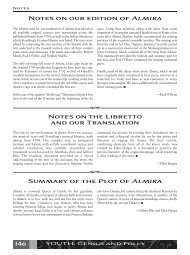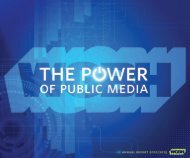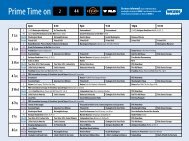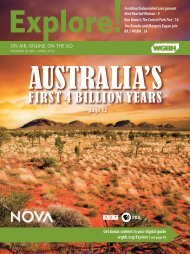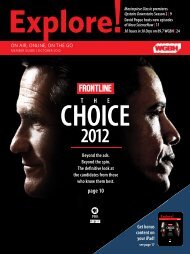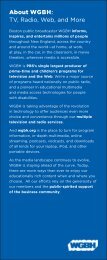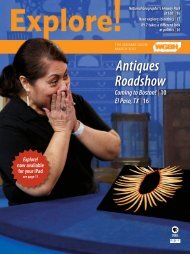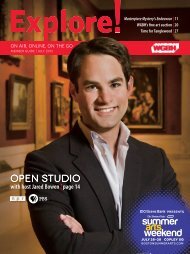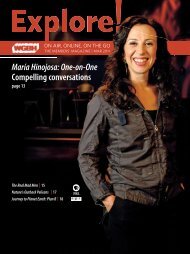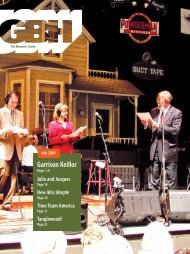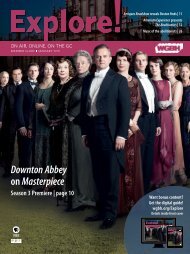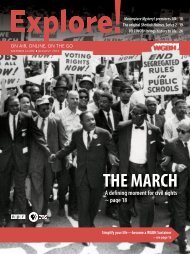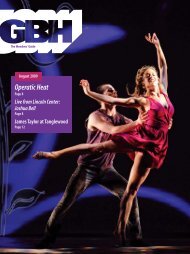Clinton - WGBH
Clinton - WGBH
Clinton - WGBH
Create successful ePaper yourself
Turn your PDF publications into a flip-book with our unique Google optimized e-Paper software.
Radio Spotlight<br />
Innovation Station<br />
Boston is known around the world as a hub of<br />
ideas, tackling issues from renewable energy<br />
and infrastructure to health care and technology<br />
with innovative solutions. In October, radio host<br />
Kara Miller launched a new program, Innovation<br />
Hub, on 89.7 <strong>WGBH</strong>, Boston Public Radio, which<br />
delves into the cool new ideas percolating in the<br />
metro-Boston area, examining how they are born<br />
and exploring what they mean for the future of<br />
our society. An assistant professor of English at<br />
the University of Massachusetts/Dartmouth,<br />
where she teaches journalism, Miller’s articles<br />
have appeared in The Boston Globe, The National<br />
Journal, The Boston Herald, Boston Magazine and<br />
The International Herald Tribune, and she’s been a<br />
frequent panelist on <strong>WGBH</strong>’s Beat the Press. Miller<br />
recently chatted with <strong>WGBH</strong>’s Jennifer Goebel<br />
about her new program and why radio is an ideal<br />
platform for talking about innovation.<br />
QHow did the idea for Innovation Hub<br />
come about?<br />
was guest-hosting Greater Boston and we<br />
A<br />
I<br />
were doing a segment on innovation, so I<br />
asked friends and people in my social network to<br />
point me in the direction of local innovators. I got<br />
an incredible number of responses, and I realized<br />
that we had something special here. I got referred<br />
to inventors of medical devices, fashion pioneers,<br />
groundbreaking patent lawyers—an amazing<br />
range. I brought the idea to Phil Redo, 89.7 <strong>WGBH</strong>’s<br />
managing director, and he felt it fit in well with<br />
the station’s priorities, so we decided to launch a<br />
show about what’s new and innovative in Boston.<br />
QTell me about the program’s format.<br />
A<br />
The show is divided into two 30-minute<br />
segments, and each half focuses on a “big<br />
question”—it could be anything from urban<br />
education to green energy, to government. Some<br />
of the shows focus on actual physical inventions,<br />
but others are more about big ideas. Essentially,<br />
we start with a problem, such as “How can you<br />
improve urban education?” Then we look at the<br />
issues: Is the root of the problem that urban kids<br />
have nowhere to go and nothing to do in the<br />
afternoons? If that’s one of the roots, what kinds<br />
of afterschool programs really work for kids? Each<br />
show has two separate guest panels, and we aim<br />
to feature people with different experiences and<br />
points of view.<br />
QWhat makes Boston a good place for<br />
innovation?<br />
A<br />
Boston has great universities, which attract<br />
young people who are coming up with all<br />
kinds of ideas in technology, gaming, science,<br />
retail. And the depth of the research community<br />
and the great minds here create a perfect<br />
environment for the incubation of new ideas.<br />
When professors or students come up with ideas<br />
for start-ups, they often want to stay close to<br />
their schools, so they headquarter them here.<br />
Kendall Square recently put in a “Walk of Fame”<br />
for great innovators, a testament to the importance<br />
the community places on ideas.<br />
QWhy is radio a good platform for a<br />
program like this?<br />
A<br />
Radio gives you a good chunk of time. You<br />
can get into deep discussions, and the ideas<br />
and innovations we’re talking about are so interesting<br />
and appealing that they fit in a long-form<br />
radio program better than they would in the<br />
kinds of shorter, bite-sized segments that exist<br />
on commercial radio and TV.<br />
QWhat does it take to do a weekly hourlong<br />
program like Innovation Hub?<br />
A<br />
A lot of preparation. Of course, one of the<br />
biggest parts is booking the panel: getting<br />
the guests we want, getting people who can speak<br />
about what they are doing on the radio, and making<br />
sure we have a good balance of perspectives.<br />
I also have to do a lot of research and background<br />
reading so that I understand the need for innovation,<br />
and so that I can challenge the panel to<br />
address the real issues and stumbling blocks that<br />
have proven to be intractable in the past. I want<br />
to be able to draw the panelists out and hear<br />
what they have to say. Then people can judge for<br />
themselves whether they think these innovations<br />
will work.<br />
QWhat drew you to doing this kind of<br />
program?<br />
A<br />
My best qualification for hosting this program<br />
is that I’m really interested in ideas of all<br />
kinds: science, education, the economy, the arts.<br />
Having that diverse range of interests, and being<br />
fascinated by the work people are doing, is what<br />
inspired this program. I’m an idea person, like so<br />
many other NPR listeners, and I’m interested in<br />
hearing how things are going to change, and how<br />
the future is going to look before we’ve seen it.<br />
QWhat accounts for the enduring<br />
popularity of radio?<br />
A<br />
I think there are two reasons. First, radio has<br />
that ability to allow long-form conversations.<br />
I love listening to Teri Gross [Fresh Air] when she<br />
has somebody on that I’m interested in hearing.<br />
I want to hear them at length. And second, you<br />
can’t watch television in your car or when you’re<br />
doing something else, like cooking. But if you’re<br />
getting dinner ready, let’s say, your body is occupied,<br />
but your brain is listening to the radio. Also,<br />
I sometimes like the fact that you don’t see people.<br />
It allows you to get beyond what people look<br />
like, and to focus on what they’re saying instead<br />
of whether their haircut is any good, what they’re<br />
wearing and other distractions.<br />
QHow did you first connect to <strong>WGBH</strong>?<br />
A<br />
I grew up in Carlisle, Massachusetts, so my<br />
connection to <strong>WGBH</strong> probably goes back to<br />
when I was five years old watching Sesame Street<br />
and other kids’ programs. I also liked Julia Child.<br />
I remember once, when I was eight, my mom had<br />
to take something to a party, so I wrote down a<br />
Julia Child recipe for a chocolate cake, writing as<br />
fast as I could to keep up with what she was saying.<br />
It turned out really well, and since my mom<br />
did not normally bake, we were all impressed.<br />
My favorite program on television now is Charlie<br />
Rose. He’s an idea person, too, and one of the<br />
people who inspired me to become a journalist.<br />
That’s really the best of what <strong>WGBH</strong> does: inspire<br />
people. And I hope that’s one of the things<br />
Innovation Hub will accomplish.<br />
Tune in Innovation Hub Saturdays at 7am and<br />
Sundays at 10pm on 89.7 <strong>WGBH</strong>, or listen online<br />
anytime at wgbh.org/radio.<br />
Schedules, program info, playlists: wgbh.org/897<br />
23



